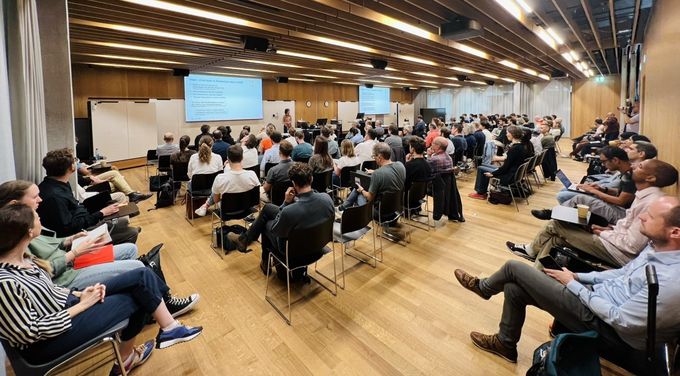Swiss TPH Conference: Beat the Heat – Cities Under Heat Stress
28.08.2025
How can cities cope with rising temperatures? Today, 130 experts from Swiss research, practice, and public authorities came together at the Swiss Tropical and Public Health Institute (Swiss TPH) to discuss the challenges of urban heat and its impact on health, and to present innovative solutions. The focus of the “Beat the Heat” conference was on the latest scientific insights and practical applications in areas such as temperature measurement, modelling and adaptation strategies. The conference was co-organized by Swiss TPH and the University of Basel.

Rising temperatures and more frequent heatwaves are a clear signal of climate change – and they pose a risk to public health. Swiss TPH monitors heat-related mortality in Switzerland on behalf of the Federal Office of Public Health (FOPH) and the Federal Office for the Environment (FOEN). The latest figures show: In summer 2024, around 326 deaths were attributed to heat. It was the sixth warmest summer in Switzerland since records began in 1864, with southern regions particularly affected.
“The findings highlight the health impact of heat and the urgent need for protective measures, as well as fostering collaboration between all stakeholders”, says Martina Ragettli project leader at Swiss TPH and part of the organizing committee. “That is why we brought together experts across disciplines and sectors to share knowledge and explore solutions to this pressing challenge.”
Insights and innovations from Switzerland and abroad
The conference was a platform for exchange among the Swiss research, services, and implementation community. Speakers showcased how science, planning and policy can work hand in hand to protect health in a warming climate. Gabriele Manoli of the Swiss Federal Institute of Technology in Lausanne (EPFL) highlighted the role of urban systems modelling, noting that “identifying the times and places where people are most exposed is key to beating the heat.”
Practical insights from city planning were brought in by Susanne Fischer and Marc Pfister of the Department of Public Works and Transport of the Canton of Basel-Stadt, who showcased the strategy and measures for climate adaptation in Basel. Their message was clear: “To beat the heat islands, all urban stakeholders must pull together.”
The private sector contribution, presented by Andreas Wicki of GEO Partner AG, stressed the relevance of integrating science into planning processes: “Shaping cities means shaping climate – which is why urban climate analysis is key.”
Finally, an international perspective was provided by Cathryn Tonne from the Barcelona Institute for Global Health (ISGlobal). She demonstrated that climate protection and adaptation, for instance, the creation of green spaces, offer numerous health benefits: “Placing health at the center of climate change mitigation creates large opportunities for promoting public health.”
Swiss TPH’s role in advancing research and solutions at the climate–health interface
Climate and environment is one of five strategic areas at Swiss TPH. With expertise ranging from environmental epidemiology and mathematical modelling to vector-borne diseases, urban planning and pesticide exposure, Swiss TPH conducts transdisciplinary and action-oriented research at the interface of climate, environment and public health. By advancing research and implementing integrated solutions together with local and global partners, we aim to mitigate the effect of climate change.
Contact

Martina Ragettli
Dr.
Project Leader
+41612848729
,
-
martina.ragettli@swisstph.ch
Stay connected
Subscribe to our newsletter and get all the latest research news, project updates, course and event listings from Swiss TPH.